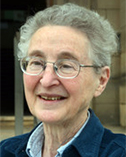
Deborah Charlesworth
University of Edinburgh
|
Primary Section: 27, Evolutionary Biology Secondary Section: 26, Genetics Membership Type:
International Member
(elected 2022)
|
Biosketch
Deborah Charlesworth is a geneticist recognized for her research towards the evolution of non-recombining regions of genomes. Much of her work has been concerned with understanding how the lack of recombination between members of sex chromosome pairs in plants and animals may have arisen, but she has also worked on other systems in which genetic recombination rates are thought to have evolved, including a form of mimicry in butterflies, and a form of plant self-incompatibility, and on the evolution of non-recombining regions. Charlesworth was born and grew up in London, UK. She obtained her Ph.D.in genetics from Cambridge University, UK, in 1968, and did postdoctoral work in Cambridge and at the University of Chicago, where she obtained a faculty position in 1988 (after several years without formal employment, but doing research at several different UK universities). She has been president of the Society for Molecular Biology and Evolution and of the European Society for Evolutionary Biology and is a fellow of the Royal Society of London.
Research Interests
Deborah Charlesworth's research group study evolutionary and population genetics, both theoretical and empirical, in the general area of the evolution of mating systems and rates of genetic recombination. Topics include the effects of breeding system differences on DNA sequence diversity and molecular evolution, and studies of inbreeding depression and of inbreeding avoidance mechanisms, including the molecular evolution of self-incompatibility loci. Her present research focuses on testing theoretical ideas about sex chromosome evolution, using genome sequence data. The group currently study a recently evolved fish system to help understand fully sex-linked regions that completely lack genetic recombination. The "classical" idea has long been that pseudo-autosomal (recombining) genome regions of sex chromosomes become converted into non-recombining fully Y-linked regions under the influence of natural selection created by partially sex-linked mutations that benefit one sex, but are deleterious in the other, which may eventually lead to the pseudo-autosomal region having extremely high rates of recombination. However, analyses of genome sequence data is revealing that several other situations can also result in Y-linked regions.

